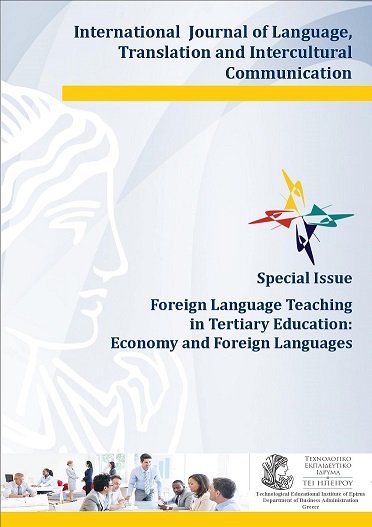Intercultural perceptions among undergraduate students in English for Business and Economics courses.

Abstract
The practice of intercultural communication should be a primary goal of Language for Specific Purposes (LSP) courses in tertiary education, because, through language instruction, future professionals can become aware of intercultural differences and develop strategies to deal with them, thus equipping themselves with necessary skills for effective cross-cultural communication in a globalized work environment. In this study, the intercultural awareness of first and second year undergraduate students attending an English for Business and Economics course was examined in relation to their interest in the economy and culture of other countries as well as to their preferred sources of information about current economic issues. Their preferences and perceptions regarding the intercultural elements incorporated in the methods and material used in the English course were also explored. The analysis of the Likert-type questionnaire revealed that intercultural awareness needs to be further practiced in class and led to important implications for the teaching methods and tasks used in the LSP courses.
Article Details
- How to Cite
-
NTELIOU, E., & KEHAGIA, O. (2016). Intercultural perceptions among undergraduate students in English for Business and Economics courses. International Journal of Language, Translation and Intercultural Communication, 4(1), 98–109. https://doi.org/10.12681/ijltic.10345
- Section
- Articles

This work is licensed under a Creative Commons Attribution-NonCommercial-ShareAlike 4.0 International License.
Copyright Notice
Authors who publish with this journal agree to the following terms:
- Authors retain copyright and grant the journal right of first publication with the work simultaneously licensed under a Creative Commons Attribution License that allows others to share the work with an acknowledgement of the work's authorship and initial publication in this journal.
- Authors are able to enter into separate, additional contractual arrangements for the non-exclusive distribution of the journal's published version of the work (e.g., post it to an institutional repository or publish it in a book), with an acknowledgement of its initial publication in this journal.
- Authors are permitted and encouraged to post their work online (e.g., in institutional repositories or on their website) prior to and during the submission process, as it can lead to productive exchanges, as well as earlier and greater citation of published work (See The Effect of Open Access).


